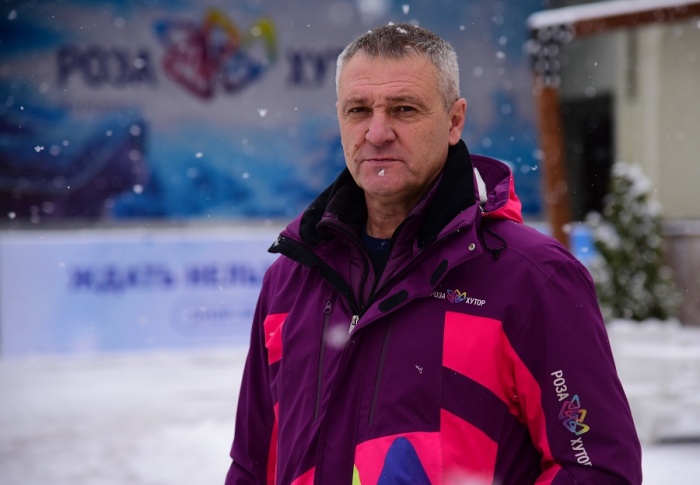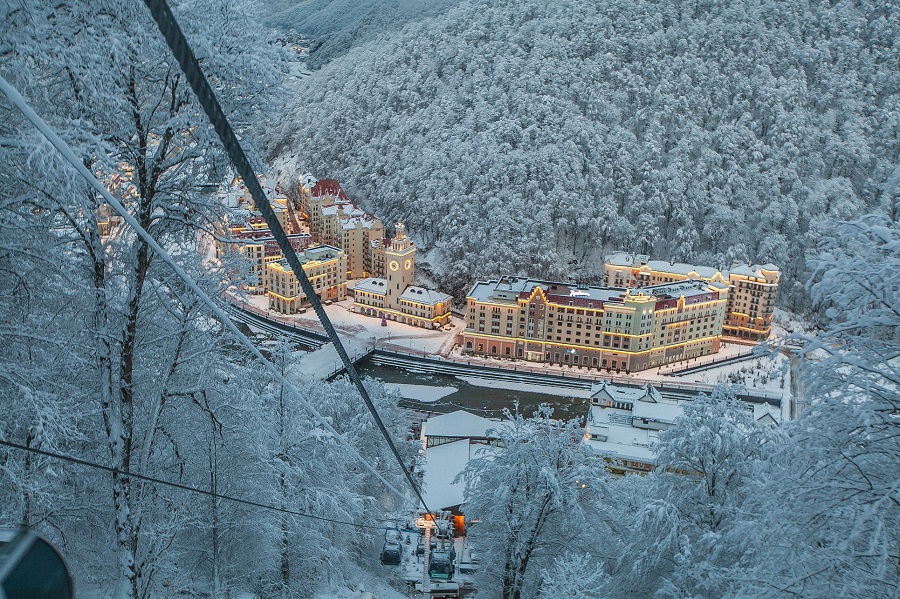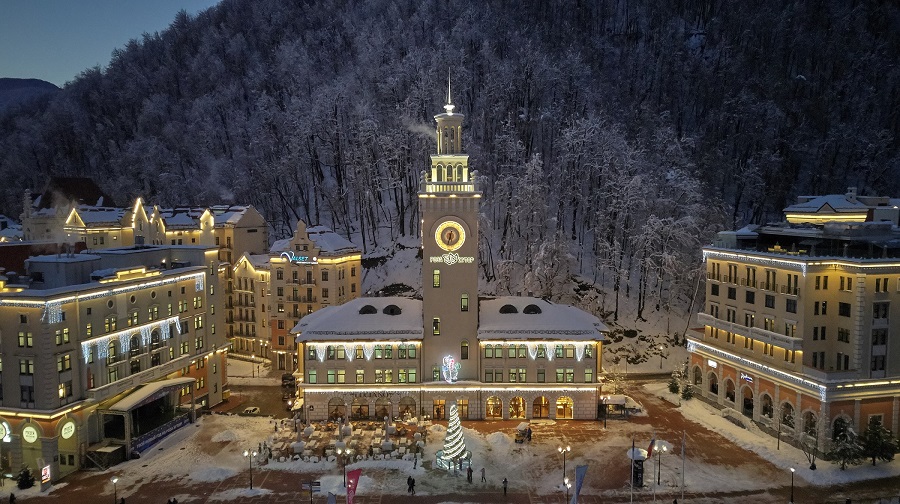
Breaking Travel News interview: Alexander Belokobylskyi, general director, Rosa Khutor
As award-winning Russian ski resort Rosa Khutor celebrates its tenth anniversary with the opening of the new Doppelmayer cable car, Breaking Travel News chats with general director, Alexander Belokobylskyi, to find out more
Breaking Travel News: The main event of the anniversary winter season will be the launch of a new ski lift from 2,320 meters above sea level to the southern slope. What can you tell us about that?
Alexander Belokobylskyi: An abandoned apiary. A wild river. A forest. Mountains. A thin thread of dirt road. And nothing more. Exactly like this, the place was where the largest mountain resort in the country, Rosa Khutor, is located.
Today there are 29 state-of-the-art lifts, over a hundred kilometres of ski pistes, and up to two million visitors annually.
On December 15th, the mountain complex celebrates its first anniversary - ten years since opening.
BTN: The tenth anniversary of Rosa Khutor is a serious date for the very young Russian ski tourism. Congratulations!
AB: Thank you, but I would like to point out that it is the tenth anniversary of the ski centre’s opening. The creation of the resort began much earlier - the company Rosa Khutor appeared back in 2003, and we started to think over the project and the concept.
ADVERTISEMENT
BTN: It turns out that the idea of creating a resort is not related to the Winter Olympics in 2014, as many think. After all, there were competitions in Alpine skiing, and the largest number of awards were drawn.
AB: The idea of creating a ski resort in Sochi’s mountains appeared even before the city won the bid to host the Olympics. The plan was to have a small resort with six lifts and several hotels. At that time, no one thought of a larger project. This was due to the lack of the necessary accompanying infrastructure - there were insufficient power and water supply and an underdeveloped road network.
However, we believe that our plans to build a ski resort played an important role in the fact that Sochi was chosen as the Olympic capital. This is due to the uniqueness of the place. It takes a lot of venues to host the Winter Olympics. And if stadiums can be built almost anywhere, if only for funding, then for skiing competitions, you need pistes with specific, rigid parameters - with a clear drop in altitude. You cannot just take a mountain and pile it on; you need special terrain!
According to the international experts’ estimates, it became clear - Rosa Khutor pistes are ideal for the Olympic starts. Naturally, after receiving the right to host the Winter Olympics, we revised our plans, and the resort became much larger.
The support of the state, which undertook the creation of the necessary engineering and road infrastructure, was of great importance. Of course, no business could bear such expenses.
BTN: When you come to Rosa Khutor today, it looks like a fairy-tale gingerbread town: pretty houses with turrets along the river, a bridge, the town hall. How did it all begin?
AB: Absolutely from scratch. When we got to the grounds, there was nothing here. At the beginning of the last century, there was a farmstead of Estonian settlers here, but it was long abandoned. In front of us, there was only a mountain river, a wild forest, and a narrow dirt road, on which it was difficult to drive to the cordon of the Caucasus Nature Reserve.
I myself was born in Krasnaya Polyana. At that time it was a small village of four-to-five thousand people. And all the surrounding beauty, the mountains, the river, the air, the forest, essentially belonged to this small group of people.
The village, despite its unique nature and climate, was not developing. There was no road. We were connected to the city by one highway with a section that the residents called “God Bless You!” Four kilometres, sheer cliff down, sheer cliff up. Large cars could not pass on such a road in winter because of the snow, and we were cut off from Sochi for weeks. Then the construction of the tunnels began, the laying of the new route. I remember when the first bus with tourists arrived in the village. It was a grand event.

BTN: Do you regret that your childhood village has changed so much? And environmentalists are concerned that the resort is encroaching on the Caucasus Biosphere Reserve.
AB: This is my homeland, and naturally, I care about everything that happens here. But this development has benefited not only Krasnaya Polyana but the entire region. When I graduated from high school, I had to leave for another city. There were simply no jobs for young people in the village.
As for environmentalists, protecting nature is a major part of their duties. But we did not build a metallurgical plant or an industrial plant. We built a resort. All those who feared that we would destroy nature now know that nothing of the sort has happened. Everything is very harmonious.
Yes, we had to cut down some trees. But we planted tens of thousands of seedlings and replanted endangered plants monitored by specialists at various levels. Besides, for some reason, no one remembers that there used to be a forestry enterprise in Krasnaya Polyana, and timber was harvested on an industrial scale. But not anymore.
All our projects have passed the main state expertise, which includes environmental issues. And, as practice shows, the requirements of Russian law are often stricter than international rules. Even today, we pay a lot of attention to the preservation of the environment. For example, we have a program for separate garbage collection, recycling, and energy conservation. Ski pistes are sown with native grass to strengthen the slopes.
BTN: How difficult was the period of Olympic construction?
AB: Naturally, the preparation for the Olympics was challenging. Our country had no experience at all with the Winter Olympics, no specialists. Foreign experts were involved. Of course, some helped us wholeheartedly, while others did the opposite. Now it is clear that we did a lot of extra work, somewhere we were forced to spend more money. For example, there is a road that leads to the finish area. A single tunnel project was made for it. But the IOC specialists insisted on building a second tunnel. And unfortunately, there were such moments. But we pulled it all off and had a really great Olympics.
BTN: After the Olympics, there were serious fears that many costly facilities would become redundant and abandoned. In your case, they clearly did not come true?
AB: We did have some concerns about the summer season. It is all clear in winter - skiing or snowboarding, but people do not understand what they can do in the mountains in summer. One of the first steps was the beach in the Imereti Lowlands, which we rented and started offering a package of accommodation in the mountains plus a transfer to the beach. We decided to develop summer activities. Today, many of them are at the resort - these are suspension bridges, high-mountain swings, rope parks, hiking, beach on the mountain lake, and much more. As a result, our summer traffic today is comparable to the winter one.
Most of all, our guests like to walk through the Mendelikha waterfall park. This is a variety of landscaped trails with stairs, platforms, benches, which open seven waterfalls to tourists at once. Every day they are visited by three to five thousand people. The next most popular is the rodelbahn, a railroad with sleds on wheels, which is located at 1,100 meters above sea level.
We launched this attraction two years ago and evaluated its financial model, but we could not even assume that our expectations would be so exceeded. Now we are going to improve the rodelban, we will make lighting, and it will work in the evening.
BTN: This summer season was very unusual. On the one hand, there is the pandemic, which has undermined tourism, and on the other hand, there is the explosive demand for travel within the country. How did you survive the quarantine, and how do you evaluate the results of the summer season?
AB: Naturally, like for other tourist sites, the quarantine was a difficult time for us. It is good that we had a pretty successful winter season, respectively, it was possible to keep all our staff. After the quarantine, the resort opened on June 20th. Weather conditions made it possible to extend the summer season until November 15th.
We plan to start the winter season on December 25th. As for the figures in numbers, they will be about 1.6 million for this year. It is not much less than in 2019.

BTN: What are you waiting for in the winter? How are the reservations going?
AB: Judging by the summer season, by how tired people were of sitting in four walls during the quarantine, we are going to have a busy winter. Today we have a chance to show those who previously did not know what Rosa Khutor was and went skiing in Italy or France that our country also has quality resorts.
We have good hotels, modern ski lifts, every summer we refine and prepare pistes, and we have 102 kilometres of them, we have very qualified staff. So there is everything to make those who come to Rosa Khutor this winter for the first time want to come back again. I can say that now the resort hotels for the January holidays are already booked almost completely, the reservation for the remaining winter months is at the pace of last year.
The winter season’s main event will be the launch of the new ski lift from 2,320 meters above sea level to the southern slope. Skiers and snowboarders love to ski on the southern slope - it is more open, there are wider and gentler pistes. But so far only two lifts work there. They are chairlifts, and they can often be closed because of adverse weather conditions. Consequently, queues accumulate, and it marred the skiing. The new lift will be a kind of doubler. It will be closed, gondola-type, with cabins for up to ten people. This will significantly reduce the queues.
BTN: This will be the 30th lift at Rosa Khutor. How many employees does it take to serve your entire household?
AB: Today, our resort employs more than 2,500 people. Together with partners and tenants, this figure is about 3,500. And if we talk about guests, it is about 15 thousand people a day together with them at the resort. A real small town! For us, our personnel are critical. We have a huge area, and we also have unique services that are not available anywhere else in the country. For example, the avalanche service. We searched for specialists for it among meteorologists all over Russia. We also have the country’s first professional lifeguard unit. It was complicated with personnel in the pre-Olympic period. Yes, we attracted foreign specialists, but someone had to adopt their experience.
For example, the snowcat drivers. You need to know how to drive on mountain slopes and not be afraid to drive such huge and expensive cars - each costs more than a million euros. We thought about it and invited the guys who used to take tourists around the mountains in jeeps. And it was a great decision. In the pre-Olympic period, our people showed real heroism. We worked day and night.
BTN: How do you plan to celebrate your anniversary?
AB: We know how to organize holidays, but this year we follow the current situation and follow all the requirements of department of the Federal Service for supervision of consumer rights protection and human welfare in the Krasnodar region .
BTN: What’s new at the resort this year?
AB: As you understood, we think big, so our plan is to revive the natural, hiking tourism, which once existed in the Soviet Union, and today is popular around the world. Unfortunately, there are many problems with the development of this direction in our country. There are so many beautiful places in Russia, but it is impossible to see them. Most often they are located in specially protected areas.
To open them to travellers, major changes in the law are necessary. But today it is time to solve these problems. For the third year in a row, we organised a conference dedicated to the development of nature tourism in our country, with respected experts’ participation. Step by step we solve this problem. It is not easy, but I am sure that the time will come, and you come to Rosa Khutor and will be able to take a backpack, choose an appropriate route and walk it.
Already today, we have more than 70 km of hiking trails at the resort, but we want to significantly expand the network of these routes and create a system of glamping, where you can stay overnight. Believe me, when you walk in the mountains, through the woods, all around silence, you get unforgettable experience and emotions. It will be possible to try this kind of recreation at Rosa Khutor next year.
More Information
Rosa Khutor is considered Russia’s Leading Ski Resort by voters at the World Ski Awards.
Find out more on the official website.

